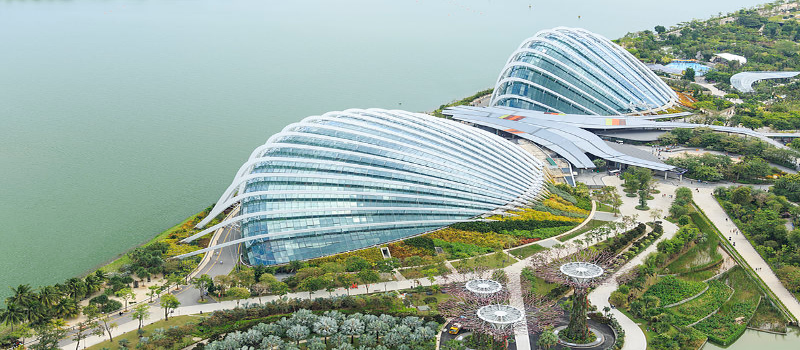Resumen
Singapur es sin duda un país fascinante y desconcertante al mismo tiempo. Por una parte, tiene una economía creciente, que se refleja en un PIB per cápita ubicado entre los más elevados del mundo, así como niveles de bienestar equiparables sólo con países nórdicos. La sociedad singapurense cuenta con los niveles educativos más destacados del orbe, por encima incluso de países desarrollados con mayor capacidad organizativa, al menos en la teoría. Asimismo, los temas de mayor vanguardia, como los índices de empleo de inteligencia artificial y lograr una mayor incidencia de hogares y negocios que utilizan medios de pago electrónicos, están presentes en el futuro inmediato de los singapurenses. Sin embargo, por otra parte, el sistema político de Singapur se encuentra más cercano a un autoritarismo estructurado alrededor de un partido hegemónico que a una república democrática, como es la apariencia que desea proyectar el líder con pretensiones sempiternas Lee Hsien Loong y su Partido Acción del Pueblo (People Action Party o PAP).
Descargas
Referencias
- APEC (2019). sitio oficial: http://www.apec.org/ ASEAN Briefing (2018).
- “Singapore Signs Upgraded Free Trade Agreement with China”. 6 de diciembre. Disponible en https://www.aseanbriefing.com/news/2018/12/06/singapore-signs-upgraded-free-trade-agreement-china.html
- Barr, M. (2019). Singapore: A Modern History, Londres y Nueva York, I.B. Tauris. DOI: https://doi.org/10.5040/9781788316446
- CaixaBank (2019). Ficha País Singapur, 2019.
- Curtis, P. J. (2017). Singapore: Unlikely Power, Oxford, Oxford University Press.
- Focus (2019). Singapore. Disponible en https://www.focus-economics.com/countries/Singapore
- Freedom House (2016). “Freedom in the World, 2016”. Disponible en https://freedomhouse.org/report/freedom-world/freedom-world-2016
- Freedom House (2017). “Freedom in the World, 2017”. Disponible en https://freedomhouse.org/report/freedom-world/freedom-world-2017
- Freedom House (2018). “Freedom in the World, 2018”. Disponible en https://freedomhouse.org/report/freedom-world/freedom-world-2018
- Freedom House (2019). “Freedom in the World, 2019”. Disponible en https://freedomhouse.org/report/freedom-world/freedom-world-2019
- Global Fire Power (2019). “Singapore Military Strenght”. Disponible en https://www.globalfirepower.com/country-military-strength-detail.asp?country_id=singapore
- Head Topics (2018). “There are 183,737 millionaires in Singapore, and 1,000 who are ‘crazy rich’: Credit Suisse”. Disponible en https://www.headtopics.com/sg/there-are-183-737-millionaires-in-singapore-and-1-000-who-are-crazy-rich-credit-suisse-2011798
- Icontainers (2019). Port of Singapore. Disponible en https://www.icontainers.com/ports/singapore/
- IMF (2019). “GDP, Current Prices”. Disponible en https://www.imf.org/external/datamapper/NGDPD@WEO/THA/MYS/SGP/PHL/IDN
- IMF (2019). Economic Outlook, 2019, Global Manufacturing Downturn, Rising Trade Barriers. Washington, D. C., IMF, octubre.
- Jacobson, M. (2010). “The Singapore Solution”, National Geographic, enero.
- Kuznets, S. (1968). Towards a Theory on Economic Growth, Toronto, George J. Mc Leod Limited.
- Lee, K. Y. (2000). From Third World to First: The Singapore History: 1965-2000, Nueva York, HarperCollins.
- MPA (2019). Operations. Singapore: Maritime and Port Authority. Disponible en https://www.mpa.gov.sg/web/portal/home/port-of-singapore/operations.
- MTI, Ministry of Trade and Industry, Republic of Singapore (2019). Economic Survey of Singapore, segundo trimestre de 2019, Singapur, MTI.
- MTI, Ministry of Trade and Industry, Republic of Singapore (2019b). “Advanced Estimations for 3Q”. Disponible en https://www.mti.gov.sg/-/media/MTI/Newsroom/Press-Releases/2019/10/Adv_Est3Q19.pdf
- MTI, Ministry of Trade and Industry, Republic of Singapore (2019c). What You Need to Know About Singapore’s Free Trade Agreements, Singapur, MTI. Disponible en https://www.mti.gov.sg/-/media/MTI/Images/Improving-Trade/FTA_Booklet_Final.pdf
- Mydans, S. (2015). “Lee Kuan Yew, Founding Father and First Premier of Singapore, Dies at 91”, The New York Times, 22 de marzo.
- Parameswaran, P. (2019). “Why the New China-Singapore Defense Agreement Matters”, The Diplomat, 20 de octubre. Disponible en https://thediplomat.com/2019/10/why-the-new-china-singapore-defense-agreement-matters/ Consultado el 28 de octubre de 2019.
- The Straits Times (2019). “When will the Singapore General Election be Called? It Could be Soon after Budget”. Disponible en https://www.straitstimes.com/politics/when-will-the-election-be-called-it-could-be-soon-after-budget
- Thought Co. (2019). “Singapore, Facts and History”. Disponible en https://www.thoughtco.com/singapore-facts-and-history
- Consultado el 28 de octubre de 2019. Turnbull, C. M. (2009). A History of Modern Singapore, 1819-2005, Singapur, National University of Singapore Press.
- World Bank (2018). “Total Reserves (includes gold, current US$)”. Disponible en https://data.worldbank.org/indicator/FI.RES.TOTL.CD
Cómo citar
Metricas Vistas/Descargas
-
Resumen visto - 2192 veces
-
PDF descargado: 2179 veces
-
XML descargado: 108 veces


